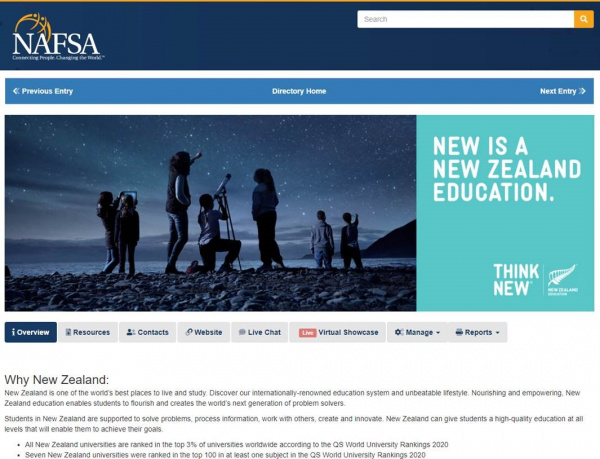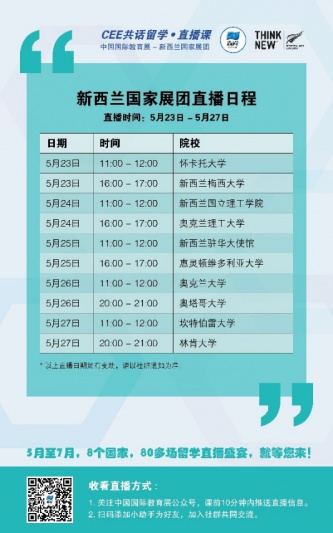Search
Showing 10 of 6660 results
-
Around the world in five
ASIA
New Zealanders see ties with Asia as increasingly important, survey shows
New Zealand’s recovery from COVID-19 will be closely tied to Asia’s, and new research from the Asia New Zealand Foundation Te Whītau Tūhono shows that more New Zealanders recognise Asia's importance to this country.
AUSTRALIA
Looking after international students during COVID-19
Australia risks losing billions in revenue, as well as its international reputation, if it continues to ignore the plight of 500,000 international students.
GLOBAL
Pandemic to redistribute international student flows: report
The Anglosphere’s international education success stories of Canada, Australia and New Zealand can look forward to a foreign enrolment windfall as they brush off the COVID-19 pandemic’s effects more quickly than heavyweights the US and UK, a report says.
UNITED KINGDOM
UK universities share plans for student quarantine
Working on the assumption that travellers to the UK will be required to self-isolate for 14 days on arrival come the new academic year, universities that will offer blended and in-person learning are now planning how to accommodate international students.
GLOBAL
All New Zealand universities continue to be ranked in the top 3% in the world
In the latest QS World University rankings, with all eight were ranked in the top 500, with the University of Auckland coming in first for New Zealand at 81st.
-
Meet the Team: Matt Penney
Could you please outline your own role and the role of the Corporate Services team?
I head up our Finance and IT teams and sit on the leadership team. I am a member of the Audit & Risk committee and chair the Digital Steering group.
Finance is responsible for paying our invoices, keeping accounting records, business partnering, helping to set budgets and reforecasting those as things change. We do a lot of reporting and work with tax people, auditors and do other forms of compliance. Audit NZ has awarded us their highest rating for the past three years.
IT provides many of the essential tools, technology, and training for us to be able to do our job. ENZ is putting in place one of the most, if not the most, advanced IT-managed cloud computing solution within the public sector.
We operate in many different jurisdictions around the world, so we face many different challenges at a local level. We are also part of the NZ Inc government sector and there is a lot of knowledge and services that we can and do share with each other.
How has COVID-19 impacted your team’s work, and what work do you have ahead of you with the recovery?
In the current environment, we have helped to reconfigure ENZ’s work programme. We have supported the identification of new activities that support the international education sector, connect with the international students in New Zealand, and gather intelligence about the markets for New Zealand providers. I think we have all gone through a reboot the last few months and as is often said, “we should never let a good crisis go to waste” and miss the chance to make positive change.
In terms of my team’s work programme, that’s actually full steam ahead. We have nearly completed our IT-managed cloud computing solution, desk phones have been replaced with soft phone telephony, we are trialling updated Zoom hardware, and putting in new, improved global managed internet connections. We are also go-live shortly with a new finance system to ensure ENZ staff can spend less time on administration and more time on value-add activities.
Can you tell me a bit about your professional background?
I belong to the New Zealand professional bodies for Directors and Chartered Accountants. and have 25 years of business experience in a mixture of private and public sector roles. Six years of that experience was gained in the UK and Ireland. I really enjoyed my time working overseas.
I joined ENZ in 2014; this is my first government agency role.
Accounting is a transferable skill, so I have had an interesting journey across many different sectors. I have toured around power stations, air traffic control towers, coal mines – who says accounting is boring!

Matt (about to receive a hand up) competing in an adventure race in China.
What do you like to do in your spare time?
My interests are built around my family; I am married with 11 and 8-year-old boys. I like my travel – one of the benefits of COVID is that my leave balance is now positive again!
Once upon a time we backpacked our way around Asia and Europe and did a truck tour across southern Africa. I have been to something like 60 countries, but these days we do more family-friendly things like go to Ohope, Rarotonga and the South Island ski fields.
I have done the annual Coast to Coast race across the South Island four times and Ironman NZ once. In the past couple of years I’ve tried adventure racing in China where we’ve won enough prize money to cover the costs of getting there. We raced in Wulong and I could not go all that way without popping in to see Felix in our nearest ENZ office in Guangzhou.
-
Future Focus Programme seeds innovation
The Future Focus Programme is a new initiative which will provide $200,000 per sector in funding to help peak bodies seed innovation projects.
The school, university, private training establishment (PTE), polytechnic (ITP), English language, and education products and services sectors are all being supported through this programme.
The funding is to be used by peak bodies to develop an innovation plan for their sector, and to initiate innovation projects. Innovation projects are to focus in the areas of product development, online delivery, new business models and the development of innovation capability.
Through this support, ENZ wishes to encourage sectors to adopt new ways of working to mitigate the impacts of COVID-19 or similarly unprecedented events.
“The Future Focus Programme is a tangible way in which ENZ can help support sectors to shape their future in the ‘new normal’ post COVID-19,” ENZ General Manager – Partnerships & Marketing, Paul Irwin, says.
“The programme is additional to our normal activities and is designed with a clear focus on innovation – part of Goal 2 of the New Zealand International Education Strategy. With all the uncertainty we are currently facing, this programme is an opportunity to take stock of what COVID-19 means for how international education can operate in the future and develop new products, services, behaviours and models to help us be more resilient to change.”
“We’re pleased to be working alongside peak bodies to help shape their future focus plans and we look forward to seeing the launch of a number of innovative projects.”
ENZ is working alongside peak bodies as they develop their innovation plans and identify prospective innovation projects. These plans and projects will be agreed over the coming weeks.
Delivery timeframes will vary according to the peak body and the scale and nature of the projects they initiate, but projects are expected to be implemented over the coming 12 to 18 months.
-
Happy birthday, SIEBA!
Today, the Schools International Education Business Association (SIEBA) has over 400 member schools. This membership hosts about 90 percent of all of international students at New Zealand schools.
As recently as 2014, there was no peak body for schools wanting to participate in international education – but not for a lack of demand.
In the same year, Education New Zealand (itself only three years at the time), set out to co-create Strategic Roadmaps with the sector. One of the biggest things to come out of our consultation with the schools sector was that they wanted their own peak body.
ENZ’s Business Development Manager for the schools sector, Mary Camp, described ENZ’s early investment as a “no-brainer”.
Now, SIEBA is completely self-sufficient financially, but ENZ’s relationship with them remains strong.
“Our relationship has been constructive, transparent and extremely successful,” Mary says. “Some examples of are work together are the Korean and Chilean government scholarship schemes and educating agents offshore.”
When COVID-19 turned the world upside down, the importance of SIEBA was underlined.
“SIEBA has been the go-to for the schools sector,” Mary says. “We are working closely with SIEBA, like all of our peak bodies, as part of the COVID-19 recovery and sector rebuild.”
SIEBA Executive Director John van der Zwan says he is immensely proud to have had the opportunity to work with New Zealand’s schools community.
“I am constantly encouraged by the work people do in the school sector, and by the amazing commitment that schools make to support the young students from around the world that come to New Zealand to learn,” he says. “All of us at SIEBA are so fortunate to be a part of a very special group of people in a very special area of education.”
John has been involved with the organisation since its inception. He was part of the working group that prepared a proposal seeking support from the school sector for a peak body in 2014.
To help SIEBA get off the ground, John was appointed as Interim Executive Director in 2015 before moving into the permanent role a year later.
“The biggest achievement for me has been working with some wonderful people to get SIEBA to a position where we are recognised, not only for how we support schools day to day, but for being prepared and ready for the role we are about play in leading our sector through the biggest crisis we will ever face,” he says.
“The SIEBA team has worked hard to know our business, build a strong reputation, develop valuable relationships with our partners and be in a great position to lead the work that lies ahead.”
-
International Student Hardship Fund now fully allocated
The fund first opened for applications on 21 May. It was met with immediate interest by a wide variety of education institutions and community groups.
A cross-ENZ team named Kāhui Oranga was charged with the fund’s administration. They met twice weekly to go through applications and ensure a balanced allocation of funds between regions, sectors and institutions.
Education providers and community organisations are disseminating grants from the fund to international students in the form of cash grants, food parcels and accommodation support.
ENZ Director of Student Experience and Global Citizens, Sahinde Pala, led Kāhui Oranga. She says the government was glad to be able to offer international students tangible support in such an uncertain time.
“At ENZ we talk a lot about manaakitanga – the offering of hospitality and respect to guests. We really want every student that comes to New Zealand to feel valued,” she says.
“It was obvious once the impacts of COVID-19 began to be felt here that we needed to offer our international students most in need extra support during these difficult times.”
Last week, Deputy Prime Minister Winston Peters and Minister for the Community and Voluntary Sector, Poto Williams, announced the Assistance for Foreign Nationals impacted by COVID-19 Programme.
This $37.6 million fund will open on 1 July and be administered by the Department of Internal Affairs. International students experiencing serious hardship will be able to apply to this programme to receive support with basic needs such as food and accommodation.
-
Virtual events around the world
Viet Nam: Career fair at Nguyen Sieu School (NSS)
Representatives from eight New Zealand providers attended a career fair at Hanoi’s Nguyen Sieu School (NSS) last month.
With no cases of community-transmitted COVID-19 for the past six weeks, Viet Nam has started to return to normal life. Schools have reopened just ahead of the end of the academic year.
Usually, the NSS Career Fair only allows in-person representatives from foreign institutions. However, thanks to ENZ’s strong relationship with the school, our institutions were represented by proxy – either an education agent or alumnus. A representative from the institution was also permitted to join via video link.
As a result, New Zealand’s presence was well ahead of our competitors like Canada (with two institutions), the UK (also two), or Australia (three).
ENZ Viet Nam Market Manager Van Banh says this is a great example of how key in-market relationships will be critical as international education looks to conduct usual activity online.
“This year’s NSS Career Fair was an exciting example of how we can incorporate digital technology into our in-person events,” she says.

North America: NAFSA eShowcase
For the first time ever, the world’s biggest B2B international education conference was held entirely online.
More than 9,000 international educators from over 100 countries were expected to attend the conference in St. Louis, Missouri over 25-29 May before COVID-19 forced organisers to take it to the digital world. In the end, over 2,000 attended the eShowcase.
Participants were able to visit ENZ’s virtual booth and engage either through chat or live video conversations at designated times.
New Zealand universities and ITPs had dedicated times to host a ‘Virtual Showcase’, which is a mechanism by which NAFSA exhibitors presented, met or collaborated with attendees via a dedicated Zoom session.
“The process of moving the largest in-person B2B international education conference in the world online has been a big learning curve, not only for ENZ and the individual booths and attendees, but for NAFSA themselves,” ENZ Director of Engagement – North America, DuBois Jennings, says.
“With no live, conference-wide chatroom or method to see a list of conference participants it felt isolating at time on the booth, which is very different from the normal, in-person NAFSA conference. However, it has been a valuable learning experience as the international education industry looks for new ways to connect virtually.”

The official NZ CEE schedule.
China: China Education Expo (CEE)
In late May, representatives from ENZ, all eight of New Zealand’s universities and the NZIST were offered a unique opportunity to engage directly with students from China and their parents.
The annual China Education Expo (CEE) is one of the biggest events in the Chinese international education calendar. But ENZ Market Development Manager, Jane Liu, says this year’s engagement through the virtual platform is greater than they would usually expect.
“Although ENZ has worked with the CEE for years, this is the first time we’ve been collaborated with them online. We can see this being useful to New Zealand institutions even after COVID-19.”
Each university provided a one-hour presentation sharing their programmes and how they can work with interested students once COVID-19 precautions have been lifted. The NZIST representative also gave a detailed introduction to the reforms the ITP sector has recently gone through.
The webinars have garnered a combined total of 1000 views, and have been recorded and hosted on WeChat so that students and parents can watch them at their leisure.
-
New ENZ agent webinar series highlights NZ's regions
Friendly and welcoming, New Zealand’s regions are a natural playground with boundless opportunity for learning. From the vibrant student city of Dunedin to the tropical coastlines and multicultural people of Northland, New Zealand’s regions are the ideal place for students eager to experience hands-on learning.
In this webinar series, agents are invited to hear from ENZ staff members and the Regional Network on each of New Zealand’s regions: their unique strengths and what they can offer international students.
Each webinar will be conducted twice on the day, at 9am and 9pm NZT.
- Wednesday, 1 July - Auckland, Northland, Taranaki
- Wednesday, 8 July - Hawke's Bay, Waikato
- Wednesday, 15 July - Manawatu, Whanganui
- Wednesday, 22 July - Wellington, Tauranga
- Wednesday, 29 July - Christchurch, Dunedin, Queenstown
- Thursday, 6 August - Gisborne, Rotorua, Nelson-Tasman, Marlborough, West Coast, Southland, South Canterbury
Go to the ‘Webinars’ section on AgentLab to attend a webinar.
-
Emergency benefit for temporary visa holders
Emergency Benefit, which was available for eligible temporary visa holders until 28 February 2021 from Work and Income at the Ministry of Social Development, has been extended to 31 August 2021.
It’s a weekly payment to help with basic living costs while the person arranges to return home as soon as they can.
You can direct in-need students to this Work and Income link to find out if they will qualify and how to apply.
Who is eligible
Foreign nationals may be able to get the Emergency Benefit if they:
- have a current temporary New Zealand visa that is not sponsored, for example a visitor visa, student visa or work visa
- are in financial hardship with no other means of support (other than money to buy a flight home)
- either:
- are arranging to return home as soon as they can, or
- can't get home because of COVID-19 travel restrictions but will do so as soon as flights are available
- are taking all reasonable steps to find other means of support, including looking for work; consular assistance; savings or support from family, friends and organisations in NZ or overseas
- have a valid passport
- have a New Zealand bank account
- have an Inland Revenue (IRD) number.
-
Recovery plan for the international education sector

The Minister of Education has announced a long-term recovery plan for the international education sector.
It includes a $51.6 million investment from the COVID-19 recovery and response fund to help reset New Zealand’s international education sector.
The Plan consists of three concurrent workstreams that focus on stabilising the international education sector, strengthening the system, and accelerating the transformation of the sector as signalled in the 2018 International Education Strategy.
It includes:
- $20 million in support for state and state-integrated schools to continue to employ the specialist international workforce to provide teaching and pastoral care to international students in New Zealand this year.
- $10 million targeted and immediate funding to private training providers of strategic importance (including English language schools) to preserve the foundations of the sector. MOE is developing eligibility criteria which will be implemented by TEC; providers can apply to TEC from mid-August.
- $1.5 million for English Language Schools to deliver English language training to migrants to help them to succeed in our schools and communities.
- $6.6 million to continue pastoral care and other activities normally funded by the Export Education Levy.
- $500k for NZQA to ensure the quality of New Zealand education being delivered offshore, and continue strengthening ongoing quality assurance processes.
ENZ will administer:
- $3 million for marketing and brand protection activities to keep New Zealand’s education brand visible in key markets and to ensure we capitalise on the strong international reputation New Zealand has gained through its handling of the COVID-19 crisis.
- $10 million to develop new future-focused products and services to drive growth in our system onshore and offshore, to ensure a more resilient sector. This will include:
- An offshore pathways initiative to enable learners to begin their New Zealand education journey from their home country and to study programmes that pathway directly into bachelors and masters degrees in New Zealand, providing greater flexibility for learners and resilience to shocks.
- A New Zealand digital platform to provide a single strong New Zealand brand and presence to enable New Zealand providers to deliver their education products and study programmes to more people offshore, and to meet changing learner needs.
Education New Zealand will also support and drive the Recovery Plan through its annual activity. This will include brand positioning, maintaining engagement with students, partners and agents offshore, student retention and transitions, building the international reputation of New Zealand education, and working with the sector and regions on innovation and new modes of delivery.
The Ministry of Education has developed criteria for the allocation of funding for Private Training Establishments (PTEs) and English language schools, to be implemented by the Tertiary Education Commission (TEC).
Fund for PTEs in financial difficulty due to COVID-19
The Private Training Establishment (PTE) Targeted Assistance Fund (TAF) closed on 11 September 2020.
PTE ESOL Provision Fund
The PTE ESOL Provision Fund closed on 28 August 2020.
Further information
- Download the Recovery Plan outline here
- Read the Minister of Education's release
- Cabinet Paper - A Strategic Recovery Plan for the International Education Sector
-
Internationalisation remains a key focus for Education New Zealand
Under the inaugural funding collaboration with FAPESP, ENZ has pledged NZ $105,000 to nine research projects. Each project is led in tandem with academics from New Zealand and Brazil.
And for the 15th year, ENZ has supported the joint work of New Zealand and Chinese researchers through the Tripartite Fund. This year’s funding round provided NZ $20,000 to five projects (rather than the traditional NZ $30,000 to three) due to the ongoing COVID-19 travel restrictions.
As the Government is currently advising New Zealanders not to travel internationally, this funding was pledged on the proviso that the researchers either work together online or delay any international travel to a later date.
Internationalisation is a crucial part of the New Zealand International Education Strategy (NZIES) under all three pillars.
“Supporting and investing in international academic mobility is one unique way ENZ can contribute to this goal. We see short-term benefits, like person-to-person links and the strengthening of diplomatic relationships, as well as long-term benefits like increased trade flow,” says ENZ’s Chief Executive Grant McPherson.
Building international links between institutions can also directly impact their rankings. Times Higher Education recently released their Latin America University Rankings 2020, which featured seven Brazilian universities in the top 10. The Times Higher Education’s methodology includes five factors – learning environment, research, citations, international outlooks and industry income – all of which can be positively impacted by initiatives like the NZ-FAPESP funding and Tripartite Fund.
“Internationalisation is all about building and maintaining relationships. I am very proud that ENZ has not only managed to sustain this crucial link with China, but built new connections with Brazil.”
Over the history of the Tripartite Fund, we’ve seen positive outcomes across a variety of research areas including environmental protection and climate change, health and medicine, animal science, educational development, media literacy, renewable energy and the conservation and heritage of national parks. The partnership with FAPESP also started with relevant areas for New Zealand, like education, engineering, biological sciences and health.
It’s a mark of the high-quality and reputation of New Zealand’s universities’ that they all are able to enter in the Tripartite Fund and arrangements like the one with FAPESP.


